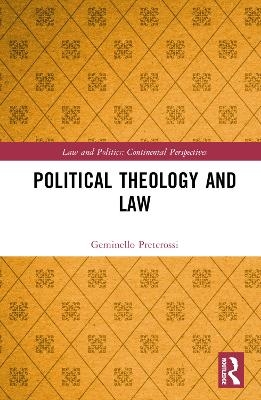
Political Theology and Law
Seiten
2022
Routledge (Verlag)
978-1-138-54982-1 (ISBN)
Routledge (Verlag)
978-1-138-54982-1 (ISBN)
The book addresses and clarifies various misunderstandings about the notion of political theology, in its multiple and even opposite meanings.
This book addresses two main questions. Can political theology be overcome? And, is what today – in referring to neoliberalism and its genealogy – many define as "economic theology" truly an alternative to political theology, as Foucault has claimed and as Agamben does today?
As a first step, the book addresses and clarifies various misunderstandings about the notion of political theology, in its multiple and even opposite meanings. It then focuses on a conceptualisation inaugurated by Carl Schmitt, which sees political theology as the eloquent matrix of modern politics: insofar as the latter produces and continuously re-elaborates an "excess" that does not belong to it, its core remains theological-political, although secularised. The bulk of the book then pursues a reading of the analogic connection between juridico-political concepts and theological-metaphysical concepts; arguing that, although the ‘turn’ to economic theology is indeed another form of political theology, it is a deeply anti-political one, which forecloses modes of resistance.
The book will be of interest to scholars, researchers and advanced students in the fields of modern political and legal philosophy and those researching the crisis of its legacy. In particular, it is addressed to those who study the relationship between theology (and its substitutes, such as hegemony and political myth) and politics, power and law, legitimacy and legality, in the perspective of secularization. In addition, the book offers a contribution to contemporary critical studies on the neoliberal state and the return of the "state of exception" in democracies, as well as a questioning of the moralization of law, which is an effect of globalist ideology and the "humanitarian turn" after 1989.
This book addresses two main questions. Can political theology be overcome? And, is what today – in referring to neoliberalism and its genealogy – many define as "economic theology" truly an alternative to political theology, as Foucault has claimed and as Agamben does today?
As a first step, the book addresses and clarifies various misunderstandings about the notion of political theology, in its multiple and even opposite meanings. It then focuses on a conceptualisation inaugurated by Carl Schmitt, which sees political theology as the eloquent matrix of modern politics: insofar as the latter produces and continuously re-elaborates an "excess" that does not belong to it, its core remains theological-political, although secularised. The bulk of the book then pursues a reading of the analogic connection between juridico-political concepts and theological-metaphysical concepts; arguing that, although the ‘turn’ to economic theology is indeed another form of political theology, it is a deeply anti-political one, which forecloses modes of resistance.
The book will be of interest to scholars, researchers and advanced students in the fields of modern political and legal philosophy and those researching the crisis of its legacy. In particular, it is addressed to those who study the relationship between theology (and its substitutes, such as hegemony and political myth) and politics, power and law, legitimacy and legality, in the perspective of secularization. In addition, the book offers a contribution to contemporary critical studies on the neoliberal state and the return of the "state of exception" in democracies, as well as a questioning of the moralization of law, which is an effect of globalist ideology and the "humanitarian turn" after 1989.
Geminello Preterossi is Full Professor of Philosophy of Law and History of Political Thought in the Department of Law of University of Salerno, Italy. He is also scientific director of the Italian Institute for Philosophical Studies in Naples, Italy.
Introduction: Can We Do Without Political Theology? 1. The Mortal God 2. The ‘Political’ as the Power of the Negative 3. The Worldly God 4. Politics as a "Religious Question" 5. Political Theology and Populism 6. Critique of Economic Theology Conclusions: The Sense of What is Missing
| Erscheinungsdatum | 26.09.2022 |
|---|---|
| Reihe/Serie | Law and Politics |
| Verlagsort | London |
| Sprache | englisch |
| Maße | 156 x 234 mm |
| Gewicht | 500 g |
| Themenwelt | Geisteswissenschaften ► Geschichte |
| Geisteswissenschaften ► Philosophie | |
| Recht / Steuern ► Allgemeines / Lexika | |
| Recht / Steuern ► EU / Internationales Recht | |
| Sozialwissenschaften ► Politik / Verwaltung ► Politische Systeme | |
| Sozialwissenschaften ► Politik / Verwaltung ► Politische Theorie | |
| ISBN-10 | 1-138-54982-7 / 1138549827 |
| ISBN-13 | 978-1-138-54982-1 / 9781138549821 |
| Zustand | Neuware |
| Haben Sie eine Frage zum Produkt? |
Mehr entdecken
aus dem Bereich
aus dem Bereich
über Alltagsorte des sozialen Zusammenhalts
Buch | Softcover (2024)
transcript (Verlag)
CHF 33,55


